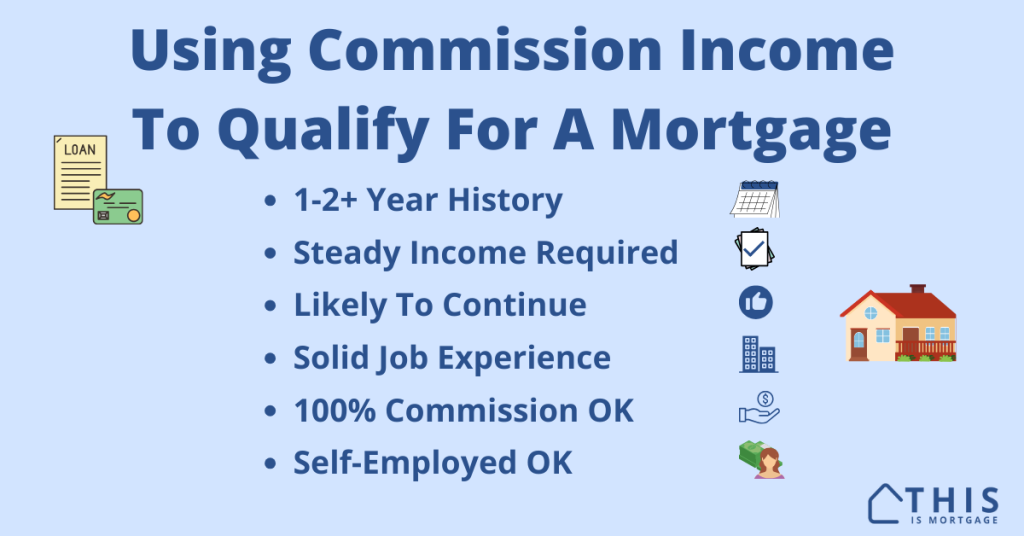If you earn commission as any portion of your income, it may help you qualify for a mortgage.
Here are guidelines for FHA loans, but principles here apply to most loan types.
See if your commission income qualifies you for FHA.
- FHA rules for commission income
- Commission history less than 2 years
- How lenders calculate commission income
- Documentation
- Do I need tax returns?
- Things that could jeopardize your ability to use commission income for the loan
- How is commission income reviewed for conventional, VA, and USDA loans?
- Commission earner? You may qualify to buy a home
FHA rules for commission income
The key ingredient lenders look for with commission is history.
FHA is one of the more lenient programs in this regard. It only requires one year of commission earnings in the same line of work. It must be likely to continue.
However, two years of history is better and will help the lender make a more solid case that you will keep earning this income.
Commission history less than 2 years
One huge topic of interest is whether less than two years of commission income history “counts” for a mortgage.
In some cases, yes.
All major loan types except VA can consider commission income with at least 12 months of history.
To take advantage of this exception, you need compensating factors such as:
- A long history in the same industry
- Your income structure changed from salary to commission but you’re doing the same thing
- You have a large down payment, great credit, and/or financial reserves after closing
- You have a base income in addition to commission
- Low debt-to-income based on commission history
Because there are too many scenarios to cover in one article, it’s best to apply and get a full income review by an underwriter to know where you stand.
Request your income review here.
How lenders calculate commission income
For FHA, the lender will use one of the following:
- Your average commission from the last two calendar years, or if less than two years, the full amount of time you’ve been earning commission
- Your most recent 12-month average, if lower than the option above
For example, you earned $20,000 in commissions two years ago, but $10,000 last year. The lender will use $10,000, or $833 per month as your commission income.
The lender will also review your year-to-date commission to ensure it aligns with your average. Following are various examples. Income used by the lender is →bolded.
| Steady commissions | Declining commissions | Low year-to-date | |
| Two years ago | →$20,000 | $20,000 | $20,000 |
| Last year | →$22,000 | →$10,000 | $22,000 |
| Year-to-date (June) | $11,000 | $6,000 | →$6,000 |
| Calculation | $20k + $22k / 24 months | $10k / 12 months | $6k / 6 months |
| Qualifying Income | $1,750/mo | $833/mo | $1,000/mo |
In some cases, the lender may use year-to-date earnings and average that into your full history. For example, if it’s June, the lender may use a 30-month average rather than 24.
If year-to-date is significantly lower than your two-year average, the lender may use year-to-date only and request an explanation of the lower income.
Here are additional things to know about income calculation:
1. When you receive commission matters
The lender will take into consideration the time of year commissions are paid.
For example, if it’s early June and you get bi-annual commission in January and July, the lender won’t penalize you for low year-to-date commission.
In this case, the underwriter will likely average the last two full calendar years of commissions earnings. Then the lender may request a verification from the employer that the January/July commission schedule is still in effect.
2. Commission is added to base salary
If you earn a base salary, the lender will add commission income to it.
The lender does not use a 24-month average of your base salary but takes your current base at face value.
For example, you earn $5,000 per month in base salary. Your 24-month commission average is $1,500 per month. Qualifying income is $6,500 per month.
3. 100% commission is okay
If you earn 100% commission, the lender will use the same methods. It will review the last two full calendar years and examine year-to-date numbers. It will request an explanation for large variances year over year.
4. Proposed commission is not counted
There’s no way to sugarcoat it: You can’t use commission income to qualify if you don’t have any history.
All loan types require 12 months of commission income. If you are about to enter a full-commission role, you have zero months of history.
You might look into a Bank Statement loan, a non-traditional mortgage type that looks at 12 to 24 months of bank statement deposits to determine your income. You must be self-employed for these loans, however.
5. Self-employed commission earners are eligible
If you are self-employed and earn commission, such as a real estate agent, the lender will likely use the last two years of 1099s. You will need tax returns and a year-to-date profit and loss to prove you are still making an income.
Documentation
To prove commission income, the lender will collect:
- Your year-to-date pay stub
- Your year-end pay stub for the last two calendar years showing yearly base and commission totals
- HR contact information
Because W2s and 1099s don’t break out commission from base, the lender will need year-end pay stubs or a salary verification from your employer. These documents break out salary, bonus, overtime, and commission. Some companies rely on third-party services like The Work Number for these verifications. Other employers rely on internal HR.
Your HR department can tell you how they usually perform verifications of employment.
See if you qualify for FHA or another loan type.
Do I need tax returns?
FHA guidelines do not require tax returns for commission earnings, even if they are more than 25% of your income. This rule changed in July 2019 and some older information online still reflects this policy.
However, if you are self-employed or own more than 25% of a business, you will need personal and business tax returns to prove commission and other income types.
Things that could jeopardize your ability to use commission income for the loan
The following are red flags for the lender when it comes to commission income.
Job changes in the previous 12 months: Commission structures can change dramatically between companies. Some lenders may want to see the first commission payment at the new company or even 12 months at the new employer to re-establish the earnings average.
Job gaps: If you took time off, some lenders may average partial-year earnings over the whole year. Some may require longer, re-established commission history for recent job gaps longer than 30 days.
Declining commission: If your commission income declined in the most recent calendar year or current year, expect to compose a solid letter of explanation. The lender will probably use the most recent calendar year commission income for qualifying purposes.
Commissions from a declining industry: As an example, a commercial real estate broker showing declining commissions from 2022 to 2023 may not be able to qualify. The underwriter may deem the income “not likely to continue” and deny the loan altogether due to the declining nature of the industry.
Request a personalized commission income review.
How is commission income reviewed for conventional, VA, and USDA loans?
Like FHA, both Fannie Mae and Freddie Mac conventional loans and USDA allow for a minimum of one year of commission income. All require compensating factors, such as great credit, reserves, or a long history in the industry.
All loan types generally calculate commission income the same way: taking a two-year average when possible and watching for declining income.
VA loans require two years of history with very few exceptions. Tax returns will be required.
USDA throws one curveball. It digs into commissions that have decreased or increased by 20% or more in the most recent year. They want the lender to verify it wasn’t a one-year fluke that could inflate qualifying income.
Commission earner? You may qualify to buy a home
Commission structures and pay can be complex, so your situation is worth a review by a lender. Before making an offer on a home, get a fully underwritten pre-approval.
At the very least, you’ll know where you stand and what to work on to get mortgage-qualified.




